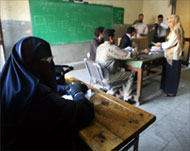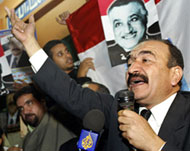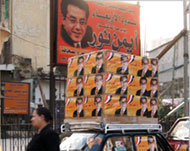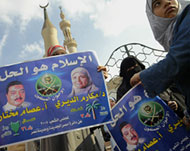Egyptians vote in key poll
Egyptians have been voting in the first phase of parliamentary elections, seen as a key test of the government’s commitment to political reform.

The polling process kicked off at 8am (0500 GMT) with polling stations opening in eight of Egypt’s 26 governorates, including the capital, Cairo.
This first round of polling involves a total of 1635 candidates vying for 164 of the People’s Assembly’s 444 seats that are up for grabs. Ten members of the assembly will be nominated.
The stakes are high for opposition groups who need at least 23 seats to have the right to field a candidate against President Hosni Mubarak’s ruling National Democratic Party (NDP) in the next presidential election.
Other parts of the country will vote on 20 November and 1 December, with second round run-offs six days later. In all, 5392 candidates are in the fray.
The final result may not come out until the middle of December. Some 32% of Egypt’s 70 million citizens are eligible to vote in this election.
Moderate turnout
Aljazeera’s Tawfiq Taha, reporting from Cairo, described the circumstances in which polling is taking place in all eight provinces as normal. Voter turnout has been moderate on what is a working day in Egypt, the government not having declared a holiday.
Observers say the turnout may improve as the day wears on. Polling centres are being protected by security personnel, against whom no charge has been made so far of interference in the process.
 |
|
A veiled Muslim Brotherhood poll |
As for violations, only one incident has been definitely reported thus far, in Beni Swaif. In this case, a false voting paper signed and stamped in favour of the ruling party was seized by a judge, who lodged a case against the alleged culprit.
There have been other complaints too but none that could be confirmed by Aljazeera.
With 17 seats, the Muslim Brotherhood is the largest opposition bloc in the Arab world’s most populous nation, but the Islamist movement led an aggressive campaign for about 150 candidates and hopes to treble its tally.
Secular opposition groups, ranging from liberals to leftists and Arab nationalists, have formed a separate alliance, fielding joint candidates for half the seats.
But in a country where many people vote for someone to bring them government resources rather than for a specific ideology, the opposition finds it hard to convince people they can do a better job than the ruling party.
Jobs wanted
“We want someone … who gives to the poor, helps the sick and provides jobs for our youth,” said Milad Nadim Wadia, a 26-year-old plumber attending an election rally.
The ruling NDP, which had more than 85% of the seats in the old parliament, is expected to win a large majority.
 |
|
Kamal Abu Aita, a candidate of |
Independent groups are mounting the most intensive monitoring operation seen in Egypt, where previous polls have involved violence and fraud, including ballot stuffing, multiple voting and abuse of state resources in favour of the NDP.
Despite street protests this year and some changes in the rules of Egyptian politics, public interest in the elections has been muted and turnout is expected to be low.
This year’s parliamentary campaign has been relatively peaceful. No deaths have been reported and civil society groups say security forces have generally not taken sides.
Some voters and witnesses reported skirmishes and electoral abuses in the first few hours after polls opened at 8am (0600 GMT), but others saw an improvement in the political climate.
‘Not democracy’
The overall level of violence appeared lower than in previous elections. On Wednesday, in the south Cairo suburb of Maadi, NDP supporters scared away voters until security forces arrived, witnesses said.
One voter there, Karim Mahmoud, said: “This is not democracy. Thugs intimidated me with knives. Only when security forces came much later was I able to go inside.”
 |
|
Posters urge voters to elect |
Wael Omar, a cameraman for the monitoring group Shayfeenkum (We are watching you), said a fight broke out at a polling station in the Torah area.
“I was filming (the fight) when an NDP-backed thug punched me in the mouth, insulted me and told me to leave. Security people just stood by,” Omar told Reuters.
In another Cairo constituency, 50 women voted and then left a polling station without indelible ink on their fingers, said Hesham el-Hilali, spokesman for an Islamist candidate.
Shayfeenkum said a polling station in the Daher district was closed because a judge was found stuffing a ballot box. It reopened after the judge was replaced, it added.
In Sayeda Zeinab in central Cairo, Muslim Brotherhood spokesman Hussein Abdel Zaher said government vehicles brought hundreds of voters, in violation of election laws.
First family
President Mubarak, his wife Suzanne and son Gamal voted together near the presidential palace in northeast Cairo. Gamal, 41, is a prominent NDP politician widely seen as a possible successor to his 77-year-old father, in power since 1981.
The elections are especially important this year because they could decide who can run to be president of the Arab state’s most populous nation at any time up to 2010.
 |
|
The banned but tolerated Muslim |
The opposition parties need at least 23 of the 444 elected seats in the lower house to retain the right to field a presidential candidate during the next parliament’s term.
The witnesses said turnout appeared to vary widely from place to place and security was heavy in some areas.
But several of those who did vote said they were encouraged by what they called a change in the political climate.
“The last time I came to vote, they didn’t want to let me in and we stood for hours,” said Fatma Zahra, a fully veiled 30-year-old woman. “This year we are seeing a lot of change.”
Mohamed Youssef, a professor of medicine who voted in the Cairo suburb of Mohandiseen, said: “I feel that there has been change. In previous elections, I used to be asked a lot of questions but so far in these elections, no one has approached me. I hope that this margin of freedom is real.”